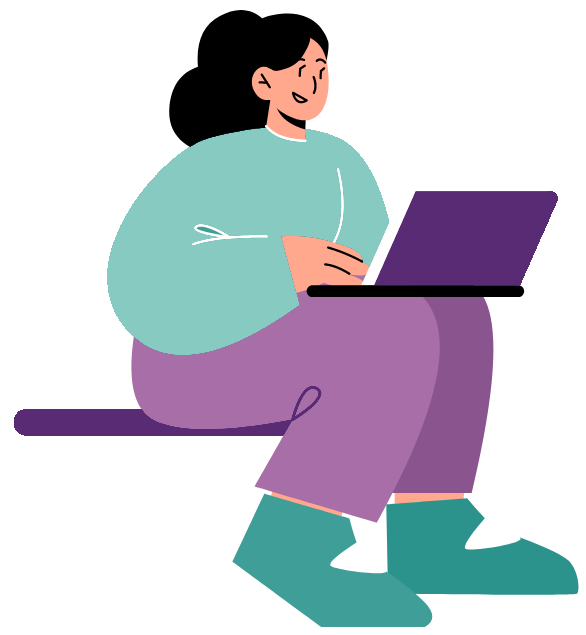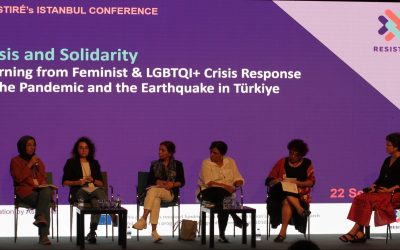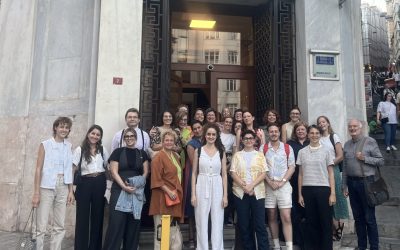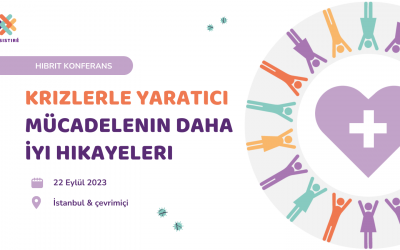The RESISTIRÉ project is designed to be participatory. The three cycles that make up the project start with in-depth research, leading to a collaborative elaboration of solutions during the Open Studios and culminating with the development of operational recommendations to mitigate the gendered inequalities caused, or exacerbated, by COVID-19 policy responses. Having completed the first project cycle, the RESISTIRÉ team is now preparing to host the second Open Studios, taking place from mid March to early April 2022.
An innovative and multidisciplinary approach to policy design
The Open Studios constitute an innovative, multidisciplinary approach to policy design, bringing together a wide diversity of participants and methods to ensure creative and innovative outputs. They are designed to produce ideas for concrete action, input for recommendations to reshape policies, and questions that still need to be answered (missing insights or knowledge). During these intensive two-day workshops, project partners will gather with activists, national researchers, policymakers, and NGO representatives to focus on specific thematic areas.
Creating Better Stories
The Open Studios focus on co-creating ‘better stories’ of responding to the socioeconomic impacts of the pandemic and the policies associated with it. These ‘better stories’ illustrate how a given (negative) societal situation can be ameliorated and that try to improve on existing practices, without being a perfect fix that turns out to be unattainable (i.e., a ‘best story’). As feminist scholar Dina Georgis (2013) argues in her book The Better Story: “There is always a better story than the better story.” The better stories serve to inspire and form the groundwork for the development of more concrete results, like policy recommendations and potential societal initiatives. In this regard, the Open Studios will try to find answers to some key questions, which include the following:
What have been some inspiring practices, initiatives, and policies that we have been able to observe in different contexts across Europe? What can we learn from them to imagine even better stories of responding to this crisis that we all share, but are not equally affected by? How can a gender+ perspective help us explore, make visible, and co-create more egalitarian and inclusive policies, initiatives, and practices?
A report summarising the findings of the second Open Studios will be available soon after the completion the four sessions. Make sure you subscribe to our newsletter to receive our project updates!
Two domains explored in four open studios
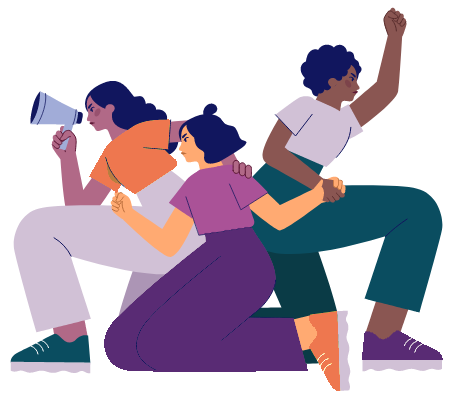
OS1 – Better is Possible: Post-pandemic Innovations to Counter Gender-Based Violence
The workshop will aim to provide solutions to the following issues:
- How to increase and improve prevention mechanisms to reduce gender-based violence (GBV), and how public spaces can be designed in a safer way, thereby minimizing the likelihood of violence and harassment.
- How to improve institutional responsiveness to GBV, as well as improving current partnerships between institutions and civil society to be able to adequately prevent, protect, support and prosecute.
- What can be done with perpetrators to change their behaviour, and what can men do in general to protect, support and show solidarity.
- To provide these solutions tailored to the needs of particularly vulnerable groups such as migrants and immigrant communities, undocumented people, LGBTQI+ people, elderly and disabled people, homeless people and traveller communities.
OS2 – Better is Possible: Young People in Education During and Beyond the Pandemic
The aim is to find solutions to help young people enrolled in education (particularly those at the end of secondary education and at the beginning of higher education), who have been deeply affected by the COVID-19 pandemic and the associated policy measures to curb infections. The focus will be on the following core issues:
- Mental Health: How do we address the widespread mental health issues that resulted from the pandemic? How can we make struggling young people more mentally healthy again and what can we do in schools and universities to prevent mental health issues from developing in the first place?
- Digital Learning: How do we equip and educate pupils/students so that they can competently take part in digital education? What are the barriers that prevent young people in education from participating in online classes and how can we address them? How do we help students from the most vulnerable groups in society to engage in digital learning?
- Hybrid Learning: Are there ways in which hybrid learning can be made more attractive to and useful for pupils/students? What is the right balance between digital learning and in-person classroom-based education?
- Transformation of Education: What transformations of education can we envision that promote and reinforce the important social functions of schools and educational institutions that, at the same time, are healthy and safe during pandemics and other crises?
OS3 – Better is Possible: Solutions for Teachers in a Post-pandemic World
The workshop will aim to develop ideas of potential actions and solutions to:
- Support teachers with digital/hybrid learning in terms of equipment and skills
- Address the changing role of teachers in the post-pandemic era, i.e., how teachers can continue to fulfill their broader role as educators (socialisation, caring, …)
- Address mental health issues and other difficulties that teachers had to deal with as a result of the pandemic (and the move to online classrooms)
OS4 – Better is Possible: Gender-based Digital Violence and Digital Activism
The workshop will aim to provide solutions to the following issues:
- Address online forms of GBV and harassment
- Support existing and new forms of digital activism that address GBV and harassment
- Improving our understanding of the role and effectiveness of digital activism
- Create digital tools that are inclusive, and that can help preserve human rights
Illustrations: pikisuperstar, upklyak

